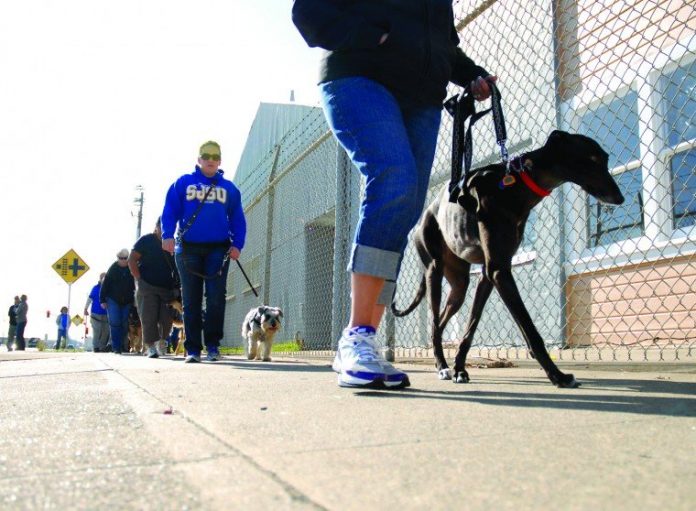
Recall the worst dream you’ve ever had.
Now consider reliving it. Monthly. Weekly. Nightly.
“Imagine you’re asleep, and you’re getting into this horrible nightmare that you dread getting into. And you can’t get out of it. It’s like you’re wrapped in cellophane,” described Gilroyan Don Baer, 65.
After 19 months in Vietnam, the U.S. Army veteran experienced violent nightmares that caused him to unintentionally hit or kick his wife in his sleep.
Having someone – or in this case, some animal – poised to pull you from the dark, psychological recesses of the subconscious and back to a state of grounded reality, said Baer, draws the line between exhausting insomnia and mental wellness.
“The dog senses this chemical change and restlessness in bed,” he said, lauding one of myriad skills of specially trained service dogs. “You come out of this horrible, rotten experience, and what do you see? Unconditional love, looking at you in the eye.”
Baer is the president/CEO of Operation Freedoms Paws, headquartered at 777 First St. in Gilroy. The 501 (c3) nonprofit has 53 teams enrolled in the program, which guides owners through the process of training their own service dogs.
Mary Cortani, 54, an Army vet of 14 years; former Army Master Instructor of Canine Education; and recent recipient of the Red Cross Heroes Award for her rehabilitation work with discharged soldiers, founded the program in 2010.
OFP hand-picks dogs from local shelters, then matches a dog to a compatible veteran. Many who go through the program struggle with issues such as post traumatic stress disorder or traumatic brain injury.
Jeremiah Gaches, a Lodi resident, said having his 2-year-old German Shepherd Rocky by his side “helps me get out into the community.”
Whereas the 34-year-old once isolated himself by hibernating in his “safe place” – at home and in bed – the Army veteran of three years who served in Korea and Iraq now “is able to talk to people. I used to have a big problem with people looking at me eye to eye.”
Cortani said service animals such as Rocky instill confidence; reduce stress levels; encourage independence; help a vet sleep peacefully; can be taught to detect oncoming diabetic shock; assist with limited mobility issues or enable their hypervigilant owner to enjoy public outings. It takes a dynamic, 32-week training regime commitment from each team to instill the foundations of a synergistic bond; the results of which, several veterans say, have transformed their lives.
“I have to take meds, but meds don’t do what the dog does,” said San Jose resident Matthew Cox.
The candid 38-year-old with a wry sense of humor served for 13 years in the Army, seven or eight of which were spent deployed in conflict.
He said his missions were to search, destroy and “find the leader of the bad guys.”
For the divorcee and father of two who at one point separated himself from his family “because it wasn’t safe for me to be around the kids,” Cox said being responsible for taking care of a dog was a step towards taking care of himself.
“If I had to pay him,” said Cox, looking down at a glossy golden retriever named Murphy resting contentedly at feet, “I’d be broke. In a whole, he’s my best friend … he made me who I am today.”
Likening her approach to a Chinese proverb (“If you give a man a fish, they’ll eat for a day. Teach a man to fish, he’ll eat for a lifetime”), Cortani said service dogs help vets address emotional wounds “they’re going to have to live with every day.”
Training the dog is the easy part, she said, “the hard part is training the person.”
After becoming a certified service animal, each dog receives additional training that tailors its abilities to its owner’s needs.
Baer, for example, who lost 40 percent his hearing while serving in Vietnam, has a yellow Labrador Retriever named Katie that acts a four-legged alarm clock. She gets her master’s attention when there’s a knocking at the door, or a ringing of the telephone.
Leona Herod, a firefighter in the U.S. Air Force who was stationed in Texas and England from 1979 to 1983, calls her long-haired service Chihuahua “the most beautiful animal in the whole wide world.”
When asked how long she served, Herod’s response was instantaneous and mechanical:
“Three years, seven months, 28 days.”
For the 52-year-old veteran overcoming PTSD, her pint-sized companion is trained to “watch my back.”
Through a tactic called “obedient disobedience,” service dogs learn to sense when their owners become anxious or stressed; reacting instinctively in a way that gets their owner’s attention.
“When I’m upset, she notices that, and she’ll slow down,” said Herod as she stroked the sleeping Chiwi – a caramel-colored mop of soft fuzz dozing in Herod’s arms. “She doesn’t respond when I’m like ‘come on, come one, let’s go!’”
Cortani is quick to clarify: “These are not companion dogs. The companionship they provide is at a level the average pet owner is not going to recognize.”
Rather, “we’re talking about invisible wounds, here.”
People such as Leod, Cox and Gaches appear to be normal, said Cortani, but stressors from past deployments cause them to deal with the every day world a little differently.
Chiming in on this, Herod said “it’s true, that joke they say: ‘How many veterans does it take to screw in a light bulb?’
The answer is, “you weren’t there. So you wouldn’t know.”
Activities regular civilians take for granted are out of the question, said Cortani, exampling trips to the supermarket or going to a movie.
“Fourth of July,” added Cox.
Military personnel, he explained, are trained to hone in on the minutiae of their surroundings, which makes simple trips to Wal-Mart or a leisurely outing at Pier 39 in San Francisco entirely unappealing.
Cox described hyper-vigilance as “constantly watching everybody’s facial language, constantly categorizing, picking out what could be a threat, what’s not a threat, asking, ‘What’s my way out?’ ‘What is my intention of being here?’”
Leod compares the ordeal to being at a fair, where targets randomly spring up from game booths and “you have to shoot at them.”
“I don’t know which one is going to come get me first,” she said. “I have to be so attentive that it just drains me to a point where I’m exhausted, completely.”
It’s these types of inner, psychological battles service dogs empower their owners to coexist with, Cortani said.
“They don’t have to be vigilant,” she said. “The dog is going to be vigilant for them.”
With a soaring success rate and growing interest, Cortani has been asked to expand OFP to four other parts of the U.S.
The only holdup is funding. Baer said it takes about $5,000 a month to cover OFP’s operating expenses, which includes providing dogs and services to vets at no cost.
Gaches attested to the difficulty of getting in to this type of program, of which there are so few.
“I tried to get into other service dog programs, but didn’t have any luck,” he said. “They were too crowded, or there weren’t enough dogs, or you would have to get on a waiting list. And some places just didn’t contact me back.”
Staring down at Murphy, Cox said having an 80-pound golden retriever shaking the bed at 6 a.m. gives him a reason to get up every morning.
“There are no amount of words I can say for what I’ve got laying at my feet,” he said. “There is no cost or value to these guys.”
Operation Freedoms Paws
• Empowers wounded veterans and others with disabilities to train and live with their own service dog.
• Meets every Saturday at 9 a.m. at 8425 Monterey St. Interested participants must apply. Applications are available at www.operationfreedomspaws.org.
• The organization needs funding. Patrons may donate to the 501(c3) nonprofit by visiting the OFP website.
• Got a spare facility? OFP seeks a 6,000-square-foot space to hold its weekly training session.
• Interested in sponsoring a dog? Call OFP President/CEO Don Baer at (408) 930-7514.
• Details: Call OFP at (408) 847-8518. Office headquarters located at 777 First St. in Gilroy.
Veterans Day in Gilroy
• A free, community breakfast will begin at 8 a.m., followed by a ceremony at 11 a.m., today at the Veterans Memorial Building 74 West 6th St. in Gilroy.













